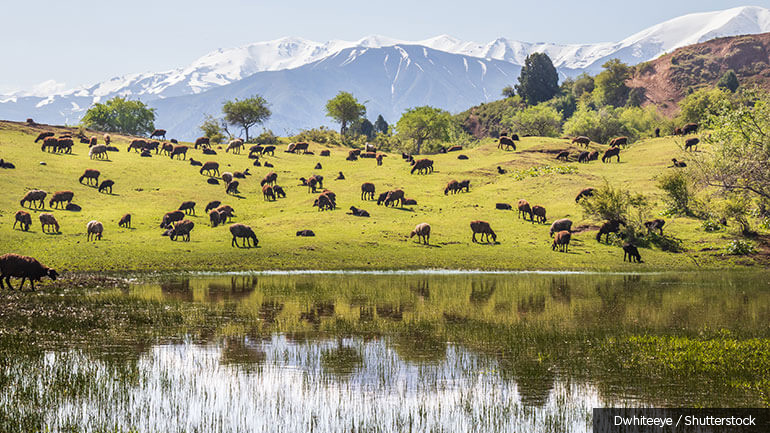
Context
Central Asia faces an urgent environmental agenda driven by the need to address land degradation, deforestation, and the escalating impacts of climate change. Fragile ecosystems across the region support rural livelihoods and economic activities, including agriculture, forestry, and tourism. However, arid conditions, overgrazing, deforestation, and intensive agricultural practices have led to widespread degradation of land and forests. This has significantly impacted food security, economic stability, and climate resilience. Compounding these issues are transboundary environmental challenges that require cooperative solutions to mitigate adverse effects and restore ecological balance.
The stakes are high, as land degradation costs Central Asian economies an estimated 6% of GDP annually, with the cost of inaction even greater. Addressing these challenges is vital not only for environmental sustainability but also for bolstering economic growth, improving rural livelihoods, and enhancing climate resilience.
Approach
PROGREEN’s programs in Central Asia aim to foster sustainable landscape management and promote collaboration across borders to address shared environmental challenges. By integrating nature-based solutions with community-driven efforts, PROGREEN focuses on rehabilitating degraded landscapes, conserving biodiversity, and advancing sustainable agricultural and forestry practices.
1. Focus on Transboundary Corridors
The initiative connects Uzbekistan with its neighbors— Kazakhstan, and the Kyrgyz Republic. These corridors, vital for maintaining ecosystem connectivity and services, encompass diverse land uses such as protected areas, forests, pastures, and agricultural lands. Activities in Uzbekistan emphasize tree-based restoration to combat land degradation, with complementary projects supported by the RESILAND CA+ Program.
2. Tree-Based Restoration
PROGREEN supports tree planting as a nature-based solution to enhance landscape resilience. Key practices include:
• Integrating trees with crops to improve soil fertility and productivity.
• Establishing tree belts to protect watersheds and control erosion.
• Implementing grazing enclosures and enrichment planting.
• Strengthening biodiversity conservation.
These practices aim to balance ecological restoration with economic benefits for local communities.
3. Regional Collaboration for Greater Impact
Recognizing the interconnected nature of Central Asia’s landscapes, PROGREEN promotes cross-border cooperation through the RESILAND CA+ program. These efforts harmonize sustainable landscape management practices across countries, leveraging shared goals to improve resilience at a regional scale. Knowledge exchange and capacity building play a critical role, with regional dialogues and technical assistance fostering a collective approach to conservation and restoration.
4. Localized Solutions for Sustainable Development
PROGREEN tailors its strategies to the specific needs of each country. In South Kazakhstan, agroforestry practices, such as private tree plantations, restore degraded agricultural lands near protected areas. In Uzbekistan, the program promotes sustainable alternatives to traditional cotton and wheat production by encouraging horticulture, agroecological food systems, and sylvopastoral techniques. These localized interventions aim to reduce environmental footprints while enhancing livelihoods.
Through these interconnected efforts, PROGREEN contributes to a greener, more resilient Central Asia, where ecosystems and communities thrive together.
Results
In Kazakhstan, PROGREEN has scaled up the GEF-financed RESILAND project since 2023, supporting community-centered agroforestry practices and building government capacity for integrated landscape management. In Uzbekistan, significant results include 280,000 hectares of land now under sustainable landscape management practices, with PROGREEN contributing directly to 14,000 hectares. Additionally, 25,000 land-users have adopted landscape restoration practices, with 1,250 of them supported directly by PROGREEN, including 375 women.
The program has also improved the management of 26,536 hectares of protected areas. Other achievements include assessing climate change impacts on terrestrial ecosystems, facilitating 11 policy dialogues focused on innovative and green futures, and preparing various studies to inform national policies. These efforts collectively contribute to improved land management and resilience in the region, supporting local economies and enhancing ecological health.